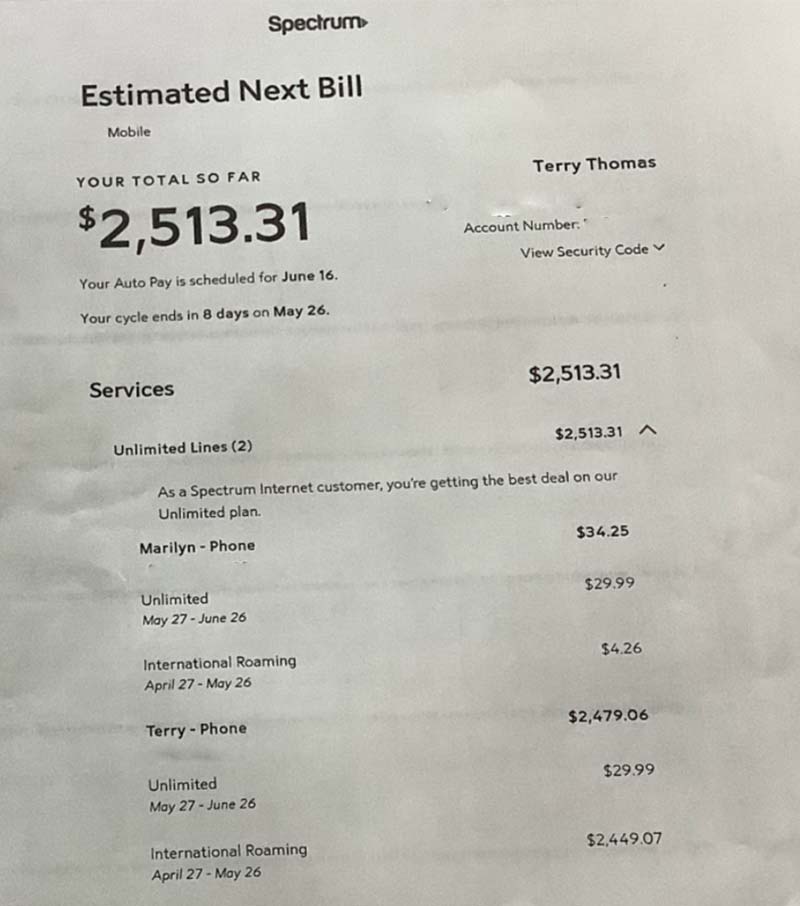Vacationing in the Maldives was a dream come true for Marilyn and Terry Thomas. That is until they got hit with a $2,452 roaming charge nightmare from Spectrum, their cell phone service provider.
The couple says they were soundly asleep as Terry’s phone racked up this shocking roaming charge after the hotel’s internet went down.
Now, as the due date for this giant bill is rapidly approaching, they’re asking Consumer Rescue for help. The couple finds it hard to believe an idle phone could accrue $2,452 in roaming charges over several hours.
But Spectrum says that phone did incur those roaming charges, and it expects the Thomases to pay the bill.
Can we rescue these consumers from their roaming charge nightmare? Let’s find out.
Spectrum alert: Here’s a roaming charge, and another… and another
Earlier this month, Marilyn and Terry set off for an exotic vacation to the Maldives. They were looking forward to relaxing and soaking up the sun in the beautiful and unique locale.
They were heading to the Reethi Beach Resort, in a very remote area of the Maldives.

Waking up early one morning to enjoy the beautiful view with a cup of coffee, Terry immediately noticed a series of disturbing emails from their cell phone service provider, Spectrum.
The first one alerted Terry of a nearly $500 roaming charge. The next alert had arrived a few hours later and announced the bill had ballooned to $1,469.
Staring at the emails in shock, the couple immediately started an online chat with Spectrum.
The agent canceled international roaming and we turned off cellular roaming, but that didn’t stop the charges.
At 8:22 am, we received another email from Spectrum saying the total charge was now $2,452. Later that day we were able to use our son’s phone to contact our credit card company who also did a three way call with Spectrum. Spectrum said the charges were valid and so nothing could be done.
Marilyn Thomas

What caused these roaming charges to accrue?
Disturbed by the turn of events but determined to enjoy the rest of their vacation, the couple found out what had gone wrong: The hotel’s internet had failed. It had gone offline for many hours. That caused Terry’s phone to pull data from the nearest cell tower.
Unfortunately, this explanation made no difference to Spectrum. After multiple attempts to get the company to reconsider the giant roaming charge bill, Marilyn contacted Consumer Rescue.
We recognize that having cellular roaming on caused the charges when the internet went down. But as soon as we realized what was happening we alerted Spectrum. Unfortunately, it [the internet failure] happened while we were sleeping. Spectrum says we have to pay the bill. Is there anything you can do to help?
Marilyn to Michelle
When Marilyn’s request for help landed on my desk, I wasn’t sure if we could help. After all, this mistake could have been easily avoided if Terry had turned off the roaming capabilities of his cell phone. But he didn’t, and, as a result, when the internet went down, his phone had continually pulled data from that local cell tower. Even though he hadn’t intended to do so, he had used a massive amount of data.
But because this happened as the couple slept and there were no specific details as to what in Terry’s phone had caused the data usage, I decided to ask Spectrum to have a look.
Asking Spectrum about these roaming charges
Hi *****,
I’m working on a case that I hoped your team could review and see what can be done. Terry and Marilyn Thomas are mobile Spectrum customers who just returned from a vacation in the Maldives. They had their mobile phones with them, but they paid the hotel for a WiFi package to send and receive emails and browse the internet.
Unfortunately, something went wrong with that internet system on May 11th around midnight (Maldives time) until the early morning. While the couple was sleeping Terry’s phone appears to have been pulling data for some reason.
The couple accrued a $2,452 bill from Spectrum even though Terry wasn’t using his phone at all. The hotel says that their internet stopped working for 6-7 hours that night and that is apparently why Terry’s phone connected to the 4G network.
Of course the couple is shocked and hope that this is a mistake. They haven’t received any kind of breakdown from Spectrum as to how this giant bill was accrued as they slept. Would your team be able to have a look at this situation and see if 1) This is not just some glitch. and 2) If it isn’t a glitch is there some way to negotiate this bill since the couple had no idea something like this could happen while they were sleeping.
Thank you!
Michelle Couch-Friedman, consumer advocate
Good news about these roaming charges
And soon, Marilyn received the good news. Spectrum reconsidered and would provide a one-time goodwill gesture to the couple.
Hi Michelle,
I just received a call from Spectrum saying they were removing the entire international roaming charges from our bill. It will happen in the next 2-3 business days. I am so grateful for your help with this as when we spoke with them, they were unwilling to do anything. Thank you!
Marilyn Thomas
And we’re very happy that Spectrum chose to provide this gesture of goodwill. One thing is for certain, Terry will never leave his cell phone vulnerable to giant roaming charges again.
How to avoid roaming charges while traveling abroad with your cell phone
Traveling abroad with your cell phone can be tricky. You may want to be able to stay connected with friends, family, and maybe even work, but if you don’t take a few precautionary steps before you leave the United States, you could be in for a similarly shocking roaming charge on your bill.
Here’s what you need to know about avoiding astronomical roaming charges while traveling with your mobile phone.
Check with your service provider
Roaming charges worldwide vary by the country you are traveling to and your specific cell phone company. Always check with your service provider before leaving on your international trip. Most companies offer data and voice packages for global roaming. Be certain you understand whatever you sign up for before you take off on your trip.
Keep your phone on airplane mode
You can connect to Wifi networks with your phone in airplane mode. There is no chance of your phone connecting to a cell phone tower or satellite in airplane mode. To ensure your phone doesn’t connect to 3G,4G, or 5G while traveling abroad, keep it on airplane mode.
Sign up for roaming charge alerts
Most cell phone providers will give you the ability to sign up for roaming charge alerts. This is a great feature that theoretically will prevent you from getting hit with giant roaming charges on your next vacation. Of course, if you are sleeping while receiving those warnings, you’ll have to deal with the aftermath when you wake up. But fortunately, you’ll be able to stop further damage and avoid compounding the problem for days.
Buy a prepaid cell phone at your destination
Another option for travelers is to buy an inexpensive throwaway phone at your destination. Many countries sell cheap mobile devices (often at the airport) that travelers can purchase and, at the same time, buy mobile data. This type of pay-as-you-go system can work out great for a traveler who will then have no chance of incurring hefty roaming charges.
Switch out the SIM card in your mobile phone
Depending on the type of cell phone you have and your service provider, you may be able to remove the SIM card inside your phone and replace it with one that contains a specific amount of international data. You may also consider buying a SIM card at your destination, which will give you a local number. Check with your cell phone provider to make certain of your device’s capabilities.
Note: As one of my editors cautioned — don’t forget to put your regular SIM card someplace safe. Those cards contain a lot of personal data.
Leave your phone off, and disconnect
Of course, there is one more recommendation that might seem controversial: Power your phone off for your entire vacation. Or even better, don’t bring it with you. Gasp!! Why not try a relaxing vacation without any chance of being blindsided by sky-high roaming charges by leaving your phone at home? Or, at the very least, leave it turned off at the bottom of your carry-on bag, never to be seen until you return home.
You just might enjoy your vacation a whole lot more if you disconnect from all devices.
I’m giving this idea some serious thought. (Michelle Couch-Friedman, Consumer Rescue)


